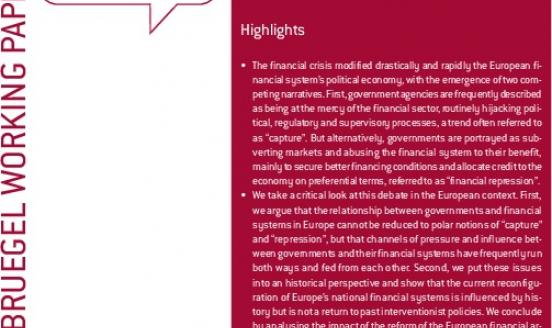The Weekender
Dear All,
Now that both the ESM and the fiscal compact negotiations are out of the way, we are entering a critical week for Greece’s negotiations, but the backdrop for global financial markets is relatively supportive: a Federal Reserve ready to keep monetary conditions loose for a longer period of time, a firmer US economy and expectations of large LTRO at the end of February.
In the euro area, there are more pressing concerns as the Bank Lending survey showed that a full-blown credit crunch was taking place in Q4, which will only increase the effects of the coordinated fiscal consolidation efforts across the continent. On the other hand, the Senior Loans Officer Survey in the US showed increase in demand for credit and some relaxation in credit standards.
Meanwhile, the politics of the crisis remain pressing. Chancellor Merkel’s speech in China sought to enlist more Chinese support but combined an unbalanced assessment of the crisis (it’s all fiscal) with an encouraging pledge for political union. But there are growing doubts in policy circles on the German strategy and on the suitability of such an aggressive European fiscal contraction.
I will focus on:
1. Key decision point on Greece
2. The internal fights inside the ECB
3. The battle for Portugal
1. Key decision point on Greece
Another round of furious negotiations took place this weekend in Athens but the reality is that the PSI is no longer a sticking issue. The IMF has in fact set two preconditions to uphold a new IMF program:
· An agreement between all political stakeholders in Greece on key elements of the new program (such that it can resist the next general elections scheduled for April).
· The ECB’s participation in the restructuring (see below) must allow a sufficient large debt reduction.
The Troika has refocused its efforts on competitiveness instead of budget consolidation and is seeking a 25% cut in wages, a 35% cut in supplementary pensions. This is an important shift in the Troika’s strategy and one that, at least implicitly, concedes that the first program was poorly designed and that such a frontloaded fiscal consolidation effort ought to be self-defeating.
Greek political leaders (Papandreou, Samaras, and Karatzaferis) have, after half a day of negotiations, agreed to endorse additional fiscal cuts worth some 1.5% of GDP for 2012 but they are still short of an agreement on hard measures to precipitate an internal devaluation. And the Troika therefore cannot sign off a new program.
In this context, the extraordinary Eurogroup meeting pre-scheduled for tomorrow and which ought to agree on the Memorandum of Understanding necessary to make available 30bn of official European money in order for the PSI exchange to take place is in a difficult position.
Meanwhile, there are talks of a potential vote by the Greek parliament for the retrofitting of CACs but this is very much in flux and depends largely on the outcome of the ongoing negotiations.
All in all, the line in the sand was set for the actual exchange to take place on the 13th of February but this requires a sequence of relatively high stakes events to take place in the next few days:
· Written agreement by the Greek authorities to agree on the conditionality of the second program (meeting scheduled for Monday morning between Greek political leaders).
· Agreement by the ECB to take a sufficiently large loss to help Greece to reach a sustainable debt level.
· Agreement by the EFSF to finance a 30bn euros necessary for the exchange.
· Agreement by the IMF to provide more capital and roll over the existing Stand By program into an Extended Fund Facility which would effectively restructure Greece’s redemption towards the IMF.
As it stands, the deadlock is at the level of the Greek political class. I don’t rule out that an agreement will be found although if it doesn’t happen, the probability of a hard default or the activation of CACs will quickly jump.
2. The internal fight inside the ECB about the LTRO
There are two important disputes taking place within the ECB. The first one is about Greece and the degree, nature and scope of any official sector involvement should there be any. The second is about the LTRO and the extent to which it should be relied upon.
On Greece, there seems to be a growing consensus in the Governing council about the fact that an OSI has become necessary. The IMF has helped the ECB to come to terms with this idea and has in fact increased the pressure by tacitly making a 100% participation rate a precondition to a second Greek program.
There are now divergences inside the ECB about the way to actually split and compensate the ECB for this loss. What is now clear is that whatever GGBs held on the investment portfolio in National Central Banks’ balance sheets will be brought for restructuring but these are relatively marginal in the overall exposure of the eurosytem.
There is a more acrimonious debate about the SMP. It is important to understand that SMP operations were conducted both by the ECB on its account but also by each individual National Central Bank. Technically speaking, during the interventions, the Bundesbank for instance, would buy a paper XX and would allocate a portion to its own account and a portion to the ECB.
The guidelines were such that if any loss would occur, they would be shared evenly amongst the eurosystem according to the ECB’s capital key. But now the governing council could decide to amend this rule in order to split the losses according to an ad hoc rule that would be different from the capital key. This would put NCBs with bigger holdings at a disadvantage, which seems hardly acceptable; but it could also be used to ship a bigger burden back on the Bank of Greece.
A possible agreement might include an exchange for the ECB that would include a smaller haircut, thereby simply returning to the Greek authorities the profit would have made if it was paid in full (the ECB average purchase price for its Greek portfolio is said to be around 75c on the euro).
Finally, it raises the question of the loss absorption capacity of the eurosystem and its possible recapitalization. The ECB has a capital of about 10bn euros, which will be totally paid up by the end of 2012 (as at the end of 2011, the total paid up capital is about 6.3bn). The eurosystem (the consolidated balance sheet of all euro area NCBs) has about 80bn of capital. So there is some margin to absorb losses. But at a time when the balance of the sheet is rising fast, after losses erode the capital base of the ECB, the situation would become rapidly uncomfortable and request for recapitalisaton of the ECB and of the NCBs would become more vocal.
The second intense discussion inside in the ECB regards the LTRO. NCBs had been given “encouragements” during the first LTRO to maximize its effects and reduce any potential negative stigma. As far as I know, there has been similar advocacy for an even bigger take up at the February 28th 3y LTRO auction but the governing council is now more divided on this issue.
Indeed, the NCBs can drive the LTRO in several ways. They have direct control on the supply, indirect control on the demand for liquidity and control on the future existence of the LTRO itself. These disagreements can manifest in at least 3 ways:
· On the supply: It is understood for instance that the Bundesbank and the Central Bank of the Netherlands are doing very limited efforts to broaden their collateral pool while the Banque de France and the Banca d’Italia are doing their utmost. This is very important because the key decision taken in December is to give discretion to National Central Banks to broaden their pool of collateral. Their ability and willingness to do so will have important impact on the effective liquidity relief given to banks.
· On the demand: Although it hasn’t been made public, there are a number of anecdotal evidence that suggest that NCBs were actively encouraging their respective banking system to place large bids at the LTRO auctions. This is likely to still be the case this time around (in Spain and Italy for instance) but it will be less homogeneous and could in fine reduce the overall LTRO amount.
· Finally, It is likely that the consensus inside the governing council has moved such that a new round of LTROs would probably be more difficult to push through after the February one.
3. The battle for Portugal
Regardless of the final outcome in Greece, it appears increasingly challenging for the Portuguese authorities to meet their deficit target for 2012 and 2013. The timing of Portugal’s return to market also appears very challenging.
In this context, it is quite clear that a second program will have to be negotiated and the quicker this happens, the better because the longer it takes, the more market participants will start to discount the possibility that Portugal and the Troika will choose to reduce Portugal’s debt burden through a restructuring rather than continue to pursue an aggressive fiscal austerity strategy.
In this respect, the ESM treaty’s latest formulation is important. Indeed, the stance of the December European Council which stressed as firmly as possible that Greece was a unique case and that restructuring would not be an option elsewhere has been watered down. The ESM treaty signed on thurdsday reads: “In accordance with IMF practice, in exceptional cases an adequate and proportionate form of private sector involvement shall be considered in cases where stability support is provided accompanied by conditionality in the form of a macro-economic adjustment programme”.
This increases the doubts in the eyes of financial markets about the replicability of the Greece restructuring to other countries.
Taking additional frontloaded consolidation measures in this context also appears self-defeating and this is largely the message of the most recent fiscal monitor update. Hence, it is very probable that the IMF and the Troika will agree to a new and more generous program in Portugal but it is probably easier for this negotiation to take place if the Greece negotiation don’t drag on or turn sour.
We cannot afford to let Portugal become a collateral victim of the current Greek negotiations and there needs to be rapid negotiation about a new Portuguese program.


